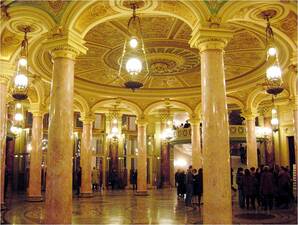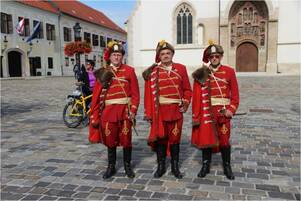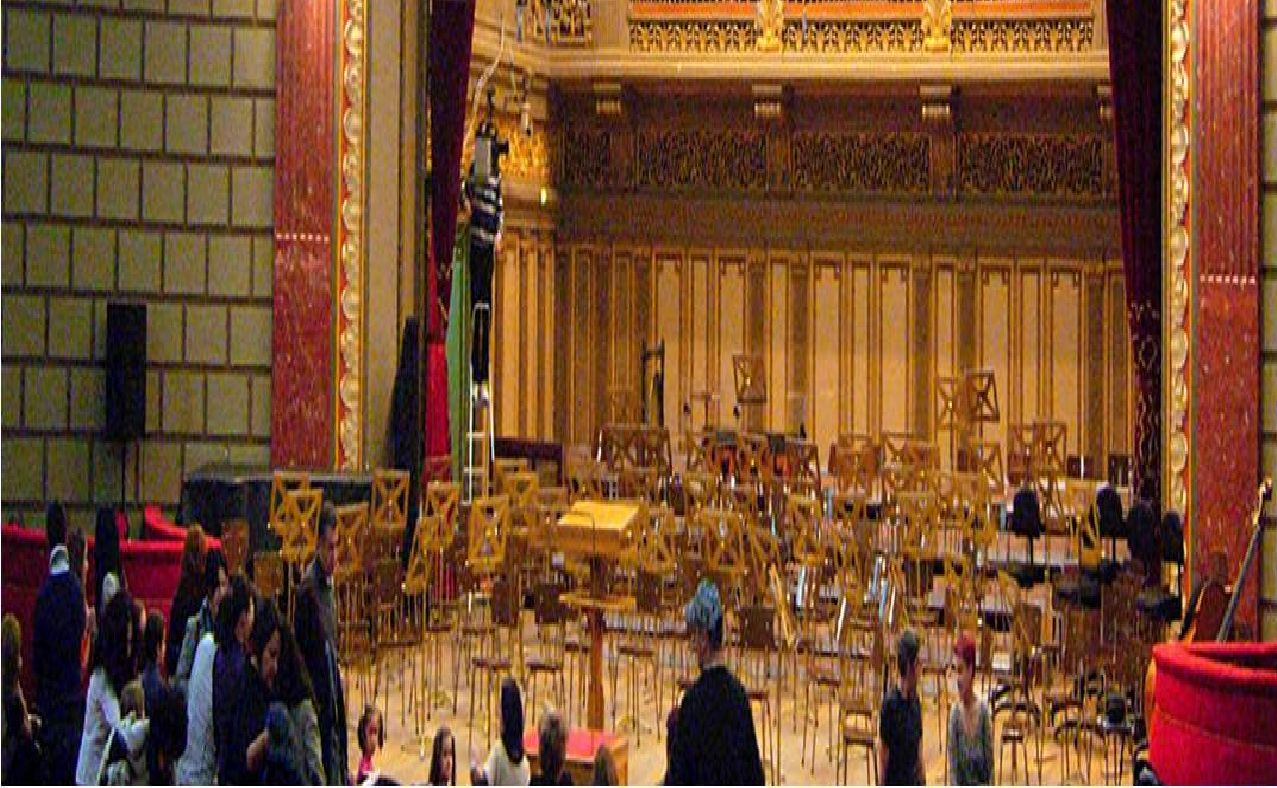2020 CYSO EUROPEAN TOUR
SLOVENIA SERBIA ROMANIA
June 25 - July 7, 2020

Frequently Asked Questions and Related Information
Background
Cascade Youth Symphony Orchestras (CYSO) has organized a European concert tour every three years since 1990. The upcoming 2020 tour will the 11th concert tour.
Tour Dates and Rehearsals
June 25 through July 7, 2020. Tour rehearsals will start immediately after the CYSO Spring Concert in early May 2020. Rehearsals will be Monday evenings, with one or two Saturday rehearsals.
Cost
$4625 per participant. This can be paid all at once or by installments. PayPal is an option.
What is the 2020 tour itinerary?
The tour orchestra will fly from Seattle to Zagreb, Croatia on June 25 or 26, 2020. The tour will include Ljubljana (Slovenia), Belgrade (Serbia), and Sibiu, Brasov and Bucharest—all in Romania as our main destinations. There are some day trips outside of these areas for some of the concerts and for visiting places of interest, such as Lake Bled, Timisoara, and Dracula’s Bran Castle.
Application Process
Applications for orchestra members should be available at the CYSO.us website in the near future.
The process typically includes--
Background
Cascade Youth Symphony Orchestras (CYSO) has organized a European concert tour every three years since 1990. The upcoming 2020 tour will the 11th concert tour.
Tour Dates and Rehearsals
June 25 through July 7, 2020. Tour rehearsals will start immediately after the CYSO Spring Concert in early May 2020. Rehearsals will be Monday evenings, with one or two Saturday rehearsals.
Cost
$4625 per participant. This can be paid all at once or by installments. PayPal is an option.
What is the 2020 tour itinerary?
The tour orchestra will fly from Seattle to Zagreb, Croatia on June 25 or 26, 2020. The tour will include Ljubljana (Slovenia), Belgrade (Serbia), and Sibiu, Brasov and Bucharest—all in Romania as our main destinations. There are some day trips outside of these areas for some of the concerts and for visiting places of interest, such as Lake Bled, Timisoara, and Dracula’s Bran Castle.
Application Process
Applications for orchestra members should be available at the CYSO.us website in the near future.
The process typically includes--
- Application form
- Two required recommendation forms completed
- Interview
- Initial payment of at least $625

Eligibility
Members of Youth Symphony typically have first priority. We also consider and accept some members of Junior Symphony. We may also consider a small number of Premiere Orchestra members, depending on skill and maturity.
Timeline for applying
Applications will be accepted starting this spring, and will remain open over the next several months, including fall of 2019. Some orchestra sections may fill early, so there is no guarantee that all sections will remain open into fall 2019. As one example, we had six clarinet players apply relatively early for one tour, and we were not able to accept additional clarinet players after that time.
How is the tour organized?
The focus of the tour will be the five concerts scheduled. These will include a rehearsal at each concert venue. We balance the focused work of performing with some guided local historical tours as well as some flexible time for exploring local points of interest.
What is included in the tour costs?
Roundtrip airfare
What is not included in the tour costs?
Members of Youth Symphony typically have first priority. We also consider and accept some members of Junior Symphony. We may also consider a small number of Premiere Orchestra members, depending on skill and maturity.
Timeline for applying
Applications will be accepted starting this spring, and will remain open over the next several months, including fall of 2019. Some orchestra sections may fill early, so there is no guarantee that all sections will remain open into fall 2019. As one example, we had six clarinet players apply relatively early for one tour, and we were not able to accept additional clarinet players after that time.
How is the tour organized?
The focus of the tour will be the five concerts scheduled. These will include a rehearsal at each concert venue. We balance the focused work of performing with some guided local historical tours as well as some flexible time for exploring local points of interest.
What is included in the tour costs?
Roundtrip airfare
- Hotels (typically two people to a room, separate beds)
- Breakfast and dinners
- Guided local tours, including entry fees to local museums associated with the guided tours
- Tour bus
- Courier (more below under “ACFEA”)
What is not included in the tour costs?
- Lunches, snacks
- Cost of passport (visas typically not required, there may be exceptions for those who are not U.S. Citizens)
- Travel insurance (recommended but not required)
- Instrument insurance (recommended but not required)
- Fees for oversize/overweight luggage (large instruments will be addressed below under “Instruments”)

Other cost considerations
A common question asked is, “How much money should a person have for daily expenses?” Other than lunches, there is no other expense other than discretionary ones. These might include souvenirs, snacks, and local events (such as concerts, entry fees or other events that a person might be interested in beyond the regular CYSO Tour activities).
Local grocery stores, markets, food stands and delis offer an array of choices for lunch. We can also assist with locating local cafes and restaurants. My recommendation is to consider roughly $15 to $20 for daily lunch and snack items. It is likely that this will be more than adequate.
Souvenirs are often on the list for tour members. Considerations include the size, weight and breakability of the items when packing them for home. Many items can be mailed or shipped, but it can be quite costly to do so. All items purchased must pass U.S. Customs requirements.
Insurance
Travel/trip insurance is recommended, but not required. Travel/trip insurance can include such things as trip cancellation, health issues, and other details. More on travel insurance below.
Instruments should be insured through your homeowner’s or renter’s insurance. Instrument insurance is not required, but CYSO will not be responsible for damaged or stolen instruments.
The good news is that for the past seven tours, I recall only one cello case and one set of tubular bells being slightly damaged. British Air paid for the damage to the cello case and the tubular bells. The cello was not damaged. We have never had an instrument lost by the airlines, or stolen in any circumstances.
Money handling
Slovenia uses Euros, Croatia uses Kuna, Serbia uses Dinar and Romania uses Leu. We will be in Croatia (Zagreb) only briefly—for lunch.
There are various ways of handling money while traveling in these countries. My personal preference is to take some cash in each of the currencies we will be using. If more cash is needed, I use a prepaid debit card (AAA Travel Card). I also carry two credit cards—one would be recommended, but I have to be prepared to cover any and all unanticipated expenses for the tour. I use the prepaid debit card to withdraw cash at ATMs and I use a credit card for purchases in stores or restaurants.
Make certain that for any and all debit or credit cards used on tour, that a PIN has been established and tested BEFORE leaving the United States.
I strongly recommend not using Travelers Cheques. We have experienced situations where some businesses refuse to accept them, and finding a bank that is convenient in terms of location and hours can be a challenge on tour.
Check with your local bank in regard to whether they can access these foreign currencies. I have gotten foreign currencies at Chase and AAA, and I understand that Wells Fargo is also a source. There typically will be an exchange fee, so you might want to shop a bit by checking AAA, the banks, and www.Travelex.com as some options. Exchanging currency at the airport is possible, but the exchange rate will be more expensive.
A common question asked is, “How much money should a person have for daily expenses?” Other than lunches, there is no other expense other than discretionary ones. These might include souvenirs, snacks, and local events (such as concerts, entry fees or other events that a person might be interested in beyond the regular CYSO Tour activities).
Local grocery stores, markets, food stands and delis offer an array of choices for lunch. We can also assist with locating local cafes and restaurants. My recommendation is to consider roughly $15 to $20 for daily lunch and snack items. It is likely that this will be more than adequate.
Souvenirs are often on the list for tour members. Considerations include the size, weight and breakability of the items when packing them for home. Many items can be mailed or shipped, but it can be quite costly to do so. All items purchased must pass U.S. Customs requirements.
Insurance
Travel/trip insurance is recommended, but not required. Travel/trip insurance can include such things as trip cancellation, health issues, and other details. More on travel insurance below.
Instruments should be insured through your homeowner’s or renter’s insurance. Instrument insurance is not required, but CYSO will not be responsible for damaged or stolen instruments.
The good news is that for the past seven tours, I recall only one cello case and one set of tubular bells being slightly damaged. British Air paid for the damage to the cello case and the tubular bells. The cello was not damaged. We have never had an instrument lost by the airlines, or stolen in any circumstances.
Money handling
Slovenia uses Euros, Croatia uses Kuna, Serbia uses Dinar and Romania uses Leu. We will be in Croatia (Zagreb) only briefly—for lunch.
There are various ways of handling money while traveling in these countries. My personal preference is to take some cash in each of the currencies we will be using. If more cash is needed, I use a prepaid debit card (AAA Travel Card). I also carry two credit cards—one would be recommended, but I have to be prepared to cover any and all unanticipated expenses for the tour. I use the prepaid debit card to withdraw cash at ATMs and I use a credit card for purchases in stores or restaurants.
Make certain that for any and all debit or credit cards used on tour, that a PIN has been established and tested BEFORE leaving the United States.
I strongly recommend not using Travelers Cheques. We have experienced situations where some businesses refuse to accept them, and finding a bank that is convenient in terms of location and hours can be a challenge on tour.
Check with your local bank in regard to whether they can access these foreign currencies. I have gotten foreign currencies at Chase and AAA, and I understand that Wells Fargo is also a source. There typically will be an exchange fee, so you might want to shop a bit by checking AAA, the banks, and www.Travelex.com as some options. Exchanging currency at the airport is possible, but the exchange rate will be more expensive.

Passport/Visa
Each member of the CYSO Tour will be required to have a current passport. It must be valid for at least 6 months past our return date. With our return date being July 5 or 6, 2020, your passport must be valid at least through January 6, 2021. The countries we will visit on this tour do not require a visa for U.S. Citizens due to the short time that we will be there.
ACFEA
Associate Consultants for Education Abroad (ACFEA) is the London-based tour company that we have used for all but two of our tours since 1990. They have been in business since 1955 and specialize in tours for musical groups. We believe that they are the best music tour company available.
As a feature of our tour, ACFEA provides a Courier. This person is an employee of ACFEA, and will meet us when we land in Europe and travel with us until we depart for the return trip to Seattle. The Courier typically speaks most or all of the languages in the countries in which we tour. If the Courier does not speak the local language, we have had an interpreter join us for that part of the tour.
The Courier makes certain that all arrangements are in order. This includes such things as assisting with hotel check in, morning and evening meals, tour bus, instrument transport, venue logistics, rehearsal details and a multitude of other areas. There are times when we encounter unanticipated situations or request to alter the schedule or minor parts of the itinerary. The Courier provides knowledgeable guidance and support in these circumstances. The Courier works closely with us to monitor the health and safety of our entire group.
For more on ACFEA, please log on to Acfea.com.
Instruments
Each musician is expected to bring their own instrument on tour. The instrument must be in a case that is substantial enough to withstand air travel and baggage handlers. Generally, a standard hard-shell case is adequate.
For most past tours, we have been able to take smaller instruments on board the airplane as carry-on. This would include violins, some violas, trumpets, flutes, clarinets and similar sizes of instruments. At this time (May 2019) we do not have details from the airline about their carry-on policies. We will provide updates as we learn more.
For larger instruments such as cellos, larger brass, percussion and other larger instruments, we have worked with our tour company and the airline to have special loading options. This generally works well at SeaTac, but is not always as easy on the return trip. Having a standard hard-shell instrument case typically works well. We will have instrument packing instructions at least a few of weeks prior to departure.
For the largest instruments—string bass, tympani, bass drum, harp—we make arrangements to rent them in Europe. There will not be an additional fee for the orchestra member in these cases. Bass players will need to take their own bow, in a hard shell case. CYSO can provide a hard shell case, if needed.
Travel Insurance/Trip Insurance
Travel insurance, also known as trip insurance, is recommended, but not required. You may have coverage through your homeowner’s policy, credit card company or other options.
Below is the link to a 2012 article from Consumers Reports--
http://www.consumerreports.org/cro/2012/06/do-you-need-travel-insurance/index.htm
AIG/Travel Guard is the company typically recommended by ACFEA, our tour company. Below is a link to more insurance information, with a variety of options to consider--
https://www.insuremytrip.com/
Below is a link to trip/travel insurance from Rick Steves--
https://www.ricksteves.com/travel-tips/trip-planning/travel-insurance
Safety
Chaperones are part of our tour structure, typically with 5 or 6 orchestra members with each chaperone. We do frequent daily checks to make certain that all tour members are healthy, present and on schedule. During periods of flexible time, such as when we are in a city or community during the day, we require that orchestra members are with either a tour adult or in groups of three to five orchestra members. In the evening, we typically require that all orchestra members remain in the hotel, unless there is a special event or other situation that we monitor. At night, all orchestra members are required to remain in their hotel rooms.
Along with the tour company, we monitor the safety of our travel by either viewing or receiving email updates from the federal website at the following link--
https://travel.state.gov/content/passports/en/alertswarnings.html
Chaperones
We welcome adult chaperones on the tour. There will be an application form on the cyso.us website in the future. There typically is an interview process.
Over the years, we have had chaperones who have joined two consecutive tours.
The cost for the tour is the same for chaperones as it is for the orchestra members. The expectations include monitoring health and safety of orchestra members; supervising, guiding and supporting structured and some unstructured times—as well as having fun. We expect that chaperones model appropriate behaviors by being on time, helping with the daily activities, and related activities. There may be some light duties involving rehearsals and concerts. There is flexible time for some independent exploring and shopping.

Food allergies, medical conditions and other health-related support
For most tours we have had individuals with life-threatening and other allergies, specific dietary needs, and other health needs. We have experience supporting these individuals to create a successful tour. Medical and related details are kept confidential.
For people with specific dietary requirements, we work with the tour company to make specific requests with the airline and the restaurants. The ACFEA Courier (see the section labeled “ACFEA” for more information about the Courier) assists with this while we are in Europe.
Expectations for orchestra members
The tour group will be about 50 people. Orchestra members are expected to be on time, take responsibility to keep their areas in good shape (on the airplane, in the hotels, in rehearsals, in the dressing rooms), and by determining how they can help the tour be successful. Taking care of personal grooming, being responsible for their instrument, music stand and music, and being a respectful roommate and tour participant are also key concepts. Understanding that we are guests in the host countries is a key factor. Being respectful and aware of other cultures is part of the learning process.
The term “Ugly American" is used to refer to perceptions of loud, arrogant, demeaning, thoughtless, ignorant, and ethnocentric behavior of American citizens mainly abroad, but also at home. It is our goal to avoid being the Ugly American while on tour.
Alcohol and illegal drugs are not allowed for orchestra members. This is in effect even in countries where the orchestra member may be of legal age, as we follow the laws of Washington State.
Bullying, harassment, intimidation, or discrimination of any kind will not be accepted or tolerated. We are guests of the hotels, concert venues and communities where we tour, and we expect that each one of us will represent CYSO, Washington State and the United States in a manner that demonstrates respect and appropriate manners.
Future topics
The above information was assembled by Dennis Burkhardt, CYSO Tour coordinator. If you have questions, please contact me at [email protected] or at 206.542.7602.
For most tours we have had individuals with life-threatening and other allergies, specific dietary needs, and other health needs. We have experience supporting these individuals to create a successful tour. Medical and related details are kept confidential.
For people with specific dietary requirements, we work with the tour company to make specific requests with the airline and the restaurants. The ACFEA Courier (see the section labeled “ACFEA” for more information about the Courier) assists with this while we are in Europe.
Expectations for orchestra members
The tour group will be about 50 people. Orchestra members are expected to be on time, take responsibility to keep their areas in good shape (on the airplane, in the hotels, in rehearsals, in the dressing rooms), and by determining how they can help the tour be successful. Taking care of personal grooming, being responsible for their instrument, music stand and music, and being a respectful roommate and tour participant are also key concepts. Understanding that we are guests in the host countries is a key factor. Being respectful and aware of other cultures is part of the learning process.
The term “Ugly American" is used to refer to perceptions of loud, arrogant, demeaning, thoughtless, ignorant, and ethnocentric behavior of American citizens mainly abroad, but also at home. It is our goal to avoid being the Ugly American while on tour.
Alcohol and illegal drugs are not allowed for orchestra members. This is in effect even in countries where the orchestra member may be of legal age, as we follow the laws of Washington State.
Bullying, harassment, intimidation, or discrimination of any kind will not be accepted or tolerated. We are guests of the hotels, concert venues and communities where we tour, and we expect that each one of us will represent CYSO, Washington State and the United States in a manner that demonstrates respect and appropriate manners.
Future topics
- Luggage
- Wardrobe recommendations
- Concert dress requirements
- Music stands
- Instrument packing
- Payment schedule
The above information was assembled by Dennis Burkhardt, CYSO Tour coordinator. If you have questions, please contact me at [email protected] or at 206.542.7602.



